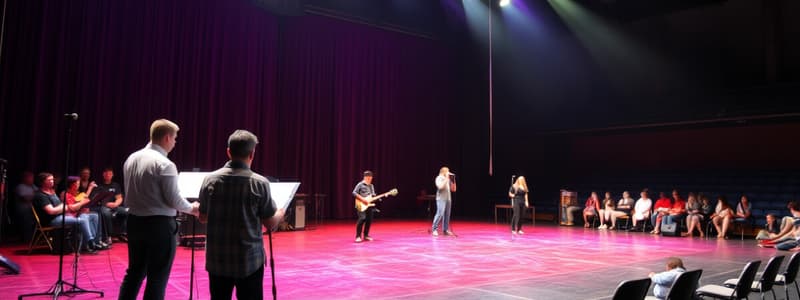Podcast
Questions and Answers
What is the first step in handling an on-stage emergency?
What is the first step in handling an on-stage emergency?
- Immediately inform the audience of the situation.
- Quickly and calmly assess the situation. (correct)
- Stop the performance until the problem is resolved.
- Call for outside assistance.
Which resource is NOT suggested for resolving a mess on stage?
Which resource is NOT suggested for resolving a mess on stage?
- Other actors who are offstage.
- An assistant stage manager.
- An actor in a maid's outfit.
- A custodian from the venue. (correct)
If an actor is too ill to perform before the show starts, what should be the first course of action?
If an actor is too ill to perform before the show starts, what should be the first course of action?
- Cancel the show immediately.
- Perform without the actor.
- Consult with the teacher or director. (correct)
- Get another actor from the audience.
What is an important consideration when an actor falls ill during a performance?
What is an important consideration when an actor falls ill during a performance?
In the case of a dropped knife on stage, who should be notified to handle it?
In the case of a dropped knife on stage, who should be notified to handle it?
Why should canceling the show be considered a last option?
Why should canceling the show be considered a last option?
What should be done if a piece of scenery fails to make an entrance?
What should be done if a piece of scenery fails to make an entrance?
What is a critical question to ask while handling a stage emergency?
What is a critical question to ask while handling a stage emergency?
What is the role of stage management regarding props?
What is the role of stage management regarding props?
Why is it important to maintain a consistent pattern when setting props?
Why is it important to maintain a consistent pattern when setting props?
What should stage management do if a prop must turn on?
What should stage management do if a prop must turn on?
What is a general rule for checking scenery?
What is a general rule for checking scenery?
What is a recommended placement for props that have a handle?
What is a recommended placement for props that have a handle?
How many times should you check the prop checklist before moving on?
How many times should you check the prop checklist before moving on?
What should you do after setting props and ensuring they are in place?
What should you do after setting props and ensuring they are in place?
What should the crew do regarding checks of all the scenery they operate?
What should the crew do regarding checks of all the scenery they operate?
Who is responsible for stopping the show in an emergency during a high school theater performance?
Who is responsible for stopping the show in an emergency during a high school theater performance?
What should you do if there is a situation in the audience during a show?
What should you do if there is a situation in the audience during a show?
When you need to stop the show, what is the appropriate way to communicate with the actors?
When you need to stop the show, what is the appropriate way to communicate with the actors?
What is one reason to have emergency cards for cast and crew members?
What is one reason to have emergency cards for cast and crew members?
What is a recommended action for teachers and sponsors in relation to emergencies?
What is a recommended action for teachers and sponsors in relation to emergencies?
If you must pause the show, what should you discuss with the actors while waiting for the all-clear?
If you must pause the show, what should you discuss with the actors while waiting for the all-clear?
Why is it important to know state laws regarding dispensing medication to students?
Why is it important to know state laws regarding dispensing medication to students?
What is a possible challenge when dealing with emergencies during a performance?
What is a possible challenge when dealing with emergencies during a performance?
What is the latest time an actor should arrive for an equity show?
What is the latest time an actor should arrive for an equity show?
Which of the following calls is NOT part of the established series before a show?
Which of the following calls is NOT part of the established series before a show?
Why is it important to repeat the 'half hour' call multiple times?
Why is it important to repeat the 'half hour' call multiple times?
What should you do after calling the 5 minute warning?
What should you do after calling the 5 minute warning?
If an actor is missing just before the show, what is the recommended first step?
If an actor is missing just before the show, what is the recommended first step?
Which action should you avoid when announcing the half hour call?
Which action should you avoid when announcing the half hour call?
After calling places, what is the next step before starting the show?
After calling places, what is the next step before starting the show?
What could happen if you omit the 15 minute call?
What could happen if you omit the 15 minute call?
What should you do if you find a significant problem after a performance?
What should you do if you find a significant problem after a performance?
What is the best action to take if a sound operator confirms a sound cue was at the correct level?
What is the best action to take if a sound operator confirms a sound cue was at the correct level?
Why is it important to have a system in place for leaving notes for department heads?
Why is it important to have a system in place for leaving notes for department heads?
What contributes to the daily changes in a theatrical performance?
What contributes to the daily changes in a theatrical performance?
If the director is absent during a performance, who is generally responsible for maintaining the actors?
If the director is absent during a performance, who is generally responsible for maintaining the actors?
What should you expect from the actors during a performance?
What should you expect from the actors during a performance?
What effect does weather have on a theater performance?
What effect does weather have on a theater performance?
What might a sound cue with a volume level lower than expected indicate?
What might a sound cue with a volume level lower than expected indicate?
Flashcards
Pre-performance checklist
Pre-performance checklist
A consistent list of tasks to complete before a performance to avoid missing crucial steps.
Stage floor cleaning
Stage floor cleaning
Cleaning the stage floor, typically by stage management, involving sweeping and mopping.
Prop setup verification
Prop setup verification
Stage management confirming the correct positioning of all props.
Prop readiness
Prop readiness
Signup and view all the flashcards
Prop consistency
Prop consistency
Signup and view all the flashcards
Prop accessibility
Prop accessibility
Signup and view all the flashcards
Scenery maintenance
Scenery maintenance
Signup and view all the flashcards
Scenery function checks
Scenery function checks
Signup and view all the flashcards
Actor call verification
Actor call verification
Signup and view all the flashcards
Actor calls schedule
Actor calls schedule
Signup and view all the flashcards
House management check-in
House management check-in
Signup and view all the flashcards
Actor location confirmation
Actor location confirmation
Signup and view all the flashcards
Communication with department heads
Communication with department heads
Signup and view all the flashcards
Emergency response
Emergency response
Signup and view all the flashcards
Performance emergency cleanup
Performance emergency cleanup
Signup and view all the flashcards
Scenery malfunction resolution
Scenery malfunction resolution
Signup and view all the flashcards
Actor absence solution
Actor absence solution
Signup and view all the flashcards
Audience notification
Audience notification
Signup and view all the flashcards
Show cancellation
Show cancellation
Signup and view all the flashcards
Audience emergency response
Audience emergency response
Signup and view all the flashcards
Show stoppage coordination
Show stoppage coordination
Signup and view all the flashcards
Emergency contact info.
Emergency contact info.
Signup and view all the flashcards
School policies on medication
School policies on medication
Signup and view all the flashcards
CPR and first-aid training
CPR and first-aid training
Signup and view all the flashcards
Study Notes
Tech Rehearsals and Checklists
- Develop a consistent checklist for pre-performance activities to avoid missing any tasks.
- Stage management oversees cleaning the stage floor (sweeping and mopping), often performed by stage management rather than set crew.
- Props are usually preset by stage management, who must verify that each prop is correctly positioned.
Prop Handling
- Ensure props are ready for use: turn on anything that needs to be operational (e.g., lamps).
- Consistency is key: props should be set identically for every performance (e.g., folded clothing, placement of items).
- Props should be easily accessible to actors, with handles facing them for quick pickup.
Scene and Scenery Maintenance
- Always check that scenery is in working order and secure before the show starts.
- Perform thorough tests of doors, flies, and wagons to ensure they function correctly.
- A rule of thumb: if you operate it, you check it.
Actor Call Management
- Verify the call board to ensure all actors have signed in before the performance.
- Give actors timely calls—commonly at half hour, 15 minutes, 5 minutes, and for places.
- Maintain a consistent calling schedule to reduce confusion among actors and crew.
Communication and Coordination
- Check in with house management after each call, especially under challenging conditions (e.g., bad weather).
- Confirm all actors are in place before starting the show.
- Ensure a clear line of communication with all department heads regarding notes after performances.
Handling Emergencies
- Address emergencies calmly, evaluating the situation and determining the best course of action.
- During a performance emergency (e.g., spilled items on stage), assess available resources and delegate the cleanup appropriately.
- If scenery fails to enter, decide if it's crucial for the scene and explore alternative options quickly.
Illness and Performance Changes
- When an actor is ill, consult the director or teacher for solutions, such as using an understudy.
- Notify the audience if a replacement actor is stepping in for a role.
- Cancelling a show should be a last resort, requiring the director's approval.
Audience Emergencies
- In case of an emergency within the audience, communicate with the house manager for assistance.
- If instructed to stop the show, address actors calmly, letting them know to leave the stage.
- Coordinate with actors on where to resume the show once the issue is resolved.
Emergency Procedures
- Collect emergency information for each cast and crew member, including medical details and contact information.
- Familiarize yourself with school policies on medication and first aid supplies.
- Encourage teachers and sponsors to be certified in CPR and first aid for effective emergency response.
Studying That Suits You
Use AI to generate personalized quizzes and flashcards to suit your learning preferences.




